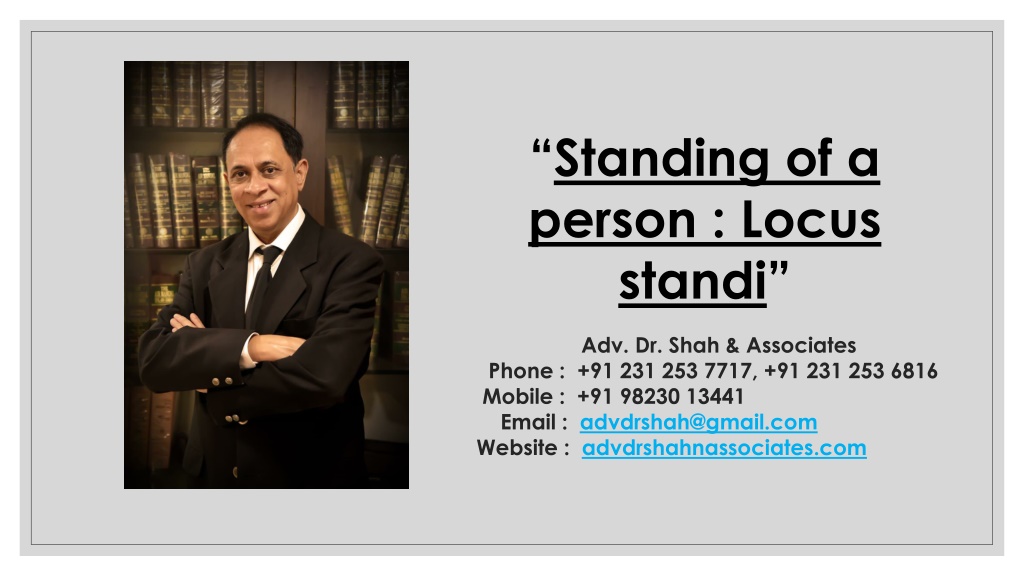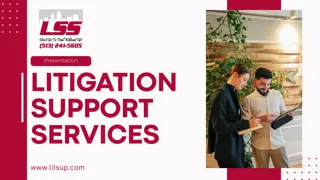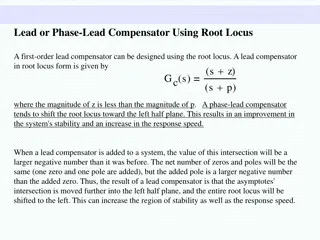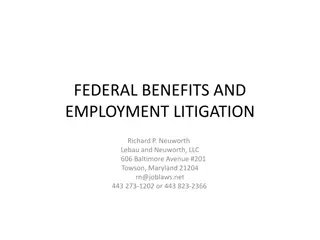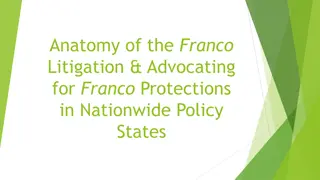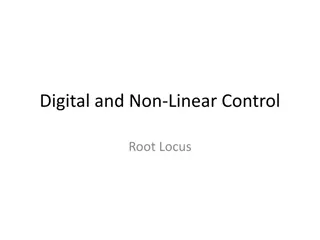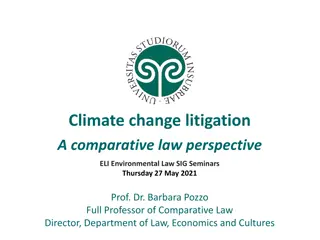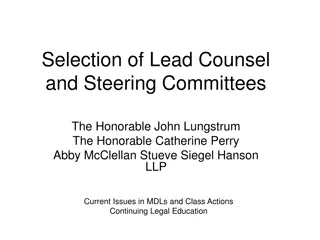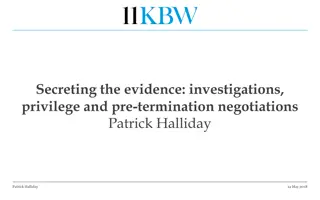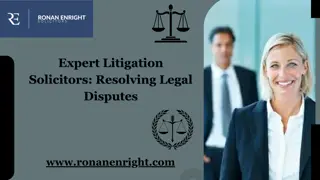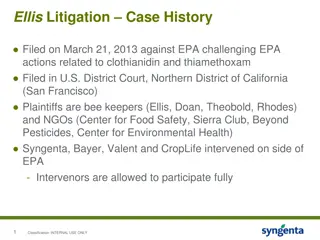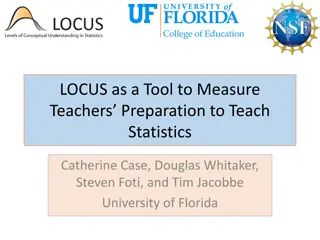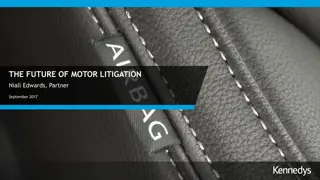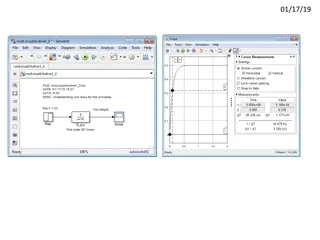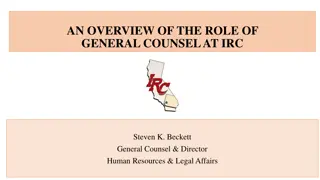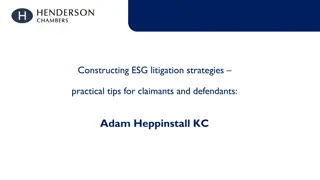Understanding Locus Standi in Legal Litigation
Introduction to the traditional doctrine of locus standi in private law litigation, focusing on the concept of standing to sue and the enforcement of one's legal rights. The article delves into the principles of standing to sue, including the right of a party to appear before a court of law and institute legal actions. It explores key legal concepts such as Damnum Sine Injuria and Injuria Sine Damnum, providing examples to illustrate these principles. Additionally, it discusses the provisions of Order 1 of the Civil Procedure Code related to joining plaintiffs and defendants in lawsuits.
Download Presentation

Please find below an Image/Link to download the presentation.
The content on the website is provided AS IS for your information and personal use only. It may not be sold, licensed, or shared on other websites without obtaining consent from the author. Download presentation by click this link. If you encounter any issues during the download, it is possible that the publisher has removed the file from their server.
E N D
Presentation Transcript
Standing of a person : Locus standi Adv. Dr. Shah & Associates Phone : +91 231 253 7717, +91 231 253 6816 Mobile : +91 98230 13441 Email : advdrshah@gmail.com Website : advdrshahnassociates.com
Standing of a person/ locus standi Introduction, traditional doctrine of locus standi in private law litigation. locus- place, standi- to stand Standing to sue right of a party to appear and be heard before court of Law or to institute a suit or an action before the court. Reasoning you must enforce your own rights Ubi jus ibi remedium whenever there is a right there is remedy. Damnum Sine Injuria damage without injury ( legal right) - No right to sue- example Gloucester Grammer School Case. Injuria Sine Damnum injury ( legal right) without damage- right to sue- example Ashby Vs White
O. 1 CPC A complete code of standing to sue in private law litigation Rule 1: Who may be joined as plaintiffs. All persons may be joined in one suit as plaintiffs where (a) any right to relief in respect of, or arising out of, the same act or transaction or series of acts or transactions is alleged to exist in such persons, whether jointly, severally or in the alternative; and (b) if such persons brought separate suits, any common question of law or fact would arise.
CPC O.1, R. 3 Rule 3: Who may be joined as defendants Rule 3: Who may be joined as defendants All persons may be joined in one suit as defendants where (a) any right to relief in respect of, or arising out of, the same act or transaction or series of acts or transactions is alleged to exist against such persons, whether jointly, severally or in the alternative; and (b) if separate suits were brought against such persons, any common question of law or fact would arise.
O. 1, Rule 8: One person may sue or defend on behalf of all in same interest. ---[ Representative suits/ class actions ] (1) Where there are numerous persons having the same interest in one suit, (a) one or more of such persons may, with the permission of the Court, sue or be sued, or may defend such suit, on behalf of, or for the benefit of, all persons so interested; b) the Court may direct that one or more of such persons may sue or be sued, or may defend such suit, on behalf of, or for the benefit of, all persons so interested. (2) The Court shall, in every case where a permission or direction is given under sub-rule (1), at the plaintiff s expense, give notice of the institution of the suit to all persons so interested either by personal service, or, where, by reason of the number of persons or any other cause, such service is not reasonably practicable, by public advertisement, as the Court in each case may direct.
(3) Any person on whose behalf, or for whose benefit, a suit is instituted or defended, under sub-rule (1), may apply to the Court to be made a party to such suit. (4) No part of the claim in any such suit shall be abandoned under sub-rule (1), and no such suit shall be withdrawn under sub-rule (3), of rule 1 of Order XXIII, and no agreement, compromise or satisfaction shall be recorded in any such suit under rule 3 of that Order, unless the Court has given, at the plaintiff s expense, notice to all persons so interested in the manner specified in sub-rule (2). (5) Where any person suing or defending in any such suit does not proceed with due diligence in the suit or defence, the Court may substitute in his place any other person having the same interest in the suit. (6) A decree passed in a suit under this rule shall be binding on all persons on whose behalf, or for whose benefit, the suit is instituted, or defended, as the case may be.
Explanation For the purpose of determining whether the persons who sue or are sued, or defend, have the same interest in one suit, it is not necessary to establish that such persons have the same cause of action as the person on whom behalf, or for whose benefit, they sue or are sued, or defend the suit, as the case may be.
Rule 8-A: Power of Court to permit a person or body of persons to present opinion or to take part in the proceedings While trying a suit, the Court may, if satisfied that a person or body of persons is interested in any question of law which is directly and substantially in issue in the suit and that it is necessary in the public interest to allow that person or body of persons to present his or its opinion on that question of law, permit that person or body of persons to present such opinion and to take such part in the proceedings of the suit as the Court may specify.
Rule 10-A: Power of Court to request any pleader to address it The Court may, in its discretion, request any pleader to address it as to any interest which is likely to be affected by its decision on any matter in issue in any suit or proceeding, if the party having the interest which is likely to be so affected is not represented by any pleader.
PUBLIC NUISANCES AND OTHER WRONGFUL ACTS AFFECTING THE PUBLIC. Sec. 91 - (1) In the case of a public nuisance or other wrongful act affecting, or likely to affect, the public, a suit for a declaration and injunction or for such other relief as may be appropriate in the circumstances of the case, may be instituted, (a) by the Advocate-General, or
(b) with the leave of the Court, by two or more persons, even though no special damage has been caused to such persons by reason of such public nuisance or other wrongful act.] (2) Nothing in this section shall be deemed to limit or otherwise affect any right of suit which may exist independently of its provisions.
CONSUMER PROTECTION ACT, 2019 A complaint under Section 12 (1)(c) of the Consumer Protection Act can be filed only on behalf of or for the benefit of all the consumers, having a common interest or a common grievance and seeking the same / identical relief against the same person.
COMPANIES ACT 2013 SEC. 245 : Class Action 245. (1) Such number of member or members, depositor or depositors or any class of them, as the case may be, as are indicated in sub-section (2) may, if they are of the opinion that the management or conduct of the affairs of the company are being conducted in a manner prejudicial to the interests of the company or its members or depositors, file an application before the Tribunal on behalf of the members or depositors for seeking all or any of the following orders, namely:
COMPETITION ACT, Under Section 53N(4) of the Competition Act, 2002, an action may be filed by or on behalf of, and for the benefit of, a class of persons having the same interest who have suffered any loss or damage, due to any anti-competitive practice or abuse of dominant position in the market by an enterprise.
Criminal Procedure Code Sec. 113 Section 113 in The Code Of Criminal Procedure, 1973 113. Summons or warrant in case of person not so present. If such person is not present in Court, the Magistrate shall issue in a summons requiring him to appear, or, when such person is in custody, a warrant directing the officer in whose custody he is to bring him before the Court: Provided that whenever it appears to such Magistrate, upon the report of a police officer or upon other information (the substance of which report or information shall be recorded by the Magistrate), that there is reason to fear the commission of a breach of the peace, and that such breach of the peace cannot be prevented otherwise than by the immediate arrest of such person, the Magistrate may at any time issue a warrant for his arrest. Municipal Council, Ratiam Vs Vardichand and ors AIR 1980 SC 1622
SEC. 9 CPC Section 9. Courts to try all civil suits unless barred .- The Courts shall (subject to the provisions herein contained) have jurisdiction to try all Suits of a civil nature excepting suits of which their cognizance is either expressly or impliedly barred. Explanation 1. As suit in which the right to property or to an office is contested is a suit of a civil nature, notwithstanding that such right may depend entirely on the decision of questions as to religious rites or ceremonies. Explanation Il For the purposes of this section, it is immaterial whether or not any fees are attached to the office referred to in Explanation I or whether or not such office is attached to a particular place
Categories of representatives suits 1. Suits to enforce religious rights or rights of people belonging to particular cast or community 2. Suit to establish or negative a public right, pathways, wells, ghats. 3. Suits to enforce rights arising at Tax payers of the municipality 4. Suit to set aside fraudulent transfers 5. Suit by co -owns 6. Suits by or against officers of clubs and associates 7. Environmental representatives suit 8. Allottee of housing board or common tenant 9. Investors
Reported categories of representative suits, complaints Reg. C.S. No. 405/1927- Pandurang Dharap and ors Vs Dr Bhimrao Ambedkar and ors in the court of civil judge Mahad under O. 1, R.8 CPC claiming the relief that Chavdhari lake be not allowed to be used by untouchables.
Environmental representative suits AIR 1969 Madras 351 Tort - Nuisance - Abatement of Villagers having common right to use water in a tank belonging to Government - Suit by some villagers in representative capacity to restrain defendants from laying salt pans in tank bed and making water saltish - Plaintiffs held entitled to injunction - Fact that other people had made water of tank saltish by establishing salt pans around tank bed is no defence. Civil P.C. (5 of1908), S.91, O.1 R.8 - Specific Relief Act (47 of1963), S.38 -
AIR 1983 Bom pg 66 Amul Cheese Civil P.C. (5 of 1908), O.1 R.8(1)(a) Permission to file representative suit - Grant of - Suit for declaration that Amul Cheese was not a purely vegetarian product and that defendants should not sell or market it as a vegetarian product sought to be filed by member of Jain community in representative capacity on ground that he along with other Jains were deceived because of misrepresentation made by defendants - Held, Court was entitled to grant permission as controversy involved was of common interest to the persons whom the plaintiff sought to represent.
AIR 1990 S.C. 642 (From : Madras ) The Chairman. Tamil Nadu Housing Board, Madras, Appellant v. T.N. Ganapathy, Respondent Civil Appeal No. 3002 of 1983, D/- 7-2-90 Suit filed by allottees of Tamil Nadu Housing Board against demanding and collecting additional amounts
Representative suits by rate- payers challenging the validity of the municipal assessment as a whole was held to be maintainable (1978 (1) Calcutta L.J. 876, (1968) to Maysur L.J. p. 172 ). Thus the rate payers were held to be having the same interest for this purpose.
III (2006) CPJ 278 (NC) NATIONAL CONSUMER DISPUTED REDRESSAL COMMISSION, NEW DELHI Hon ble Mr. Justice K.S. Gupta, Presiding Member & Mr. B.K. Taimni, Member TAMIL NADU HOUSING BOARD COLONY ASSOCIATION ---- Appellant Vs TAMIL NADU HOUSING BOARD & ANR. ---- Respondent First Appeal No. 255 of 2003 Decided on 10-05-2006 Consumer Protection Act, 1986 Section 2(1)(b) Complainant Complaint filed by association Maintainability Complainant is association of allottees of houses allotted by Housing Board Complaint respecting common facilities to be made available by OP- Body of persons, forming association, in pursuance of common purpose are consumers complainant within extended definition under Section 2(1)(b)(iv) State Commission erroneously dismissed complaint on wrong interpretation/ comprehension of Section 2(1)(b) Impugned order set aside Complaint maintainable Matter remanded.
III (2005) CPJ 568 RAJASTHAN STATE CONSUMER DISPUTED REDRESSAL COMMISSION, JAIPUR Hon ble Mr. Justice Sunil Kkumar Garg, President & Mrs. Sushma Tanwar, Member RAJASHTAN STATE ROAD TRANSPORT CORPORATION --- Appellant SUNIL KUMAR & ORS. --- Respondents Appeal No. 2139 of 2003 Decided on 21-04-2005 Vs (I) Consumer Protection Act, 1986 Sections 2(1) (g)and 12 (c) Civil Procedure Code, 1908 Order 1 Rule 8 Complaint Maintainability of Classaction Complainants travelling in AC bus AC not functioning properly Complainants joined as one unit, filed complaint Case could be treated as class action, prior permission of Fourm not necessary Complaint maintainable. complainants passengers filed a joint complaint against Rajastan State Road Corporation alleging non functioning of the air-conditioner in their bus.
(2011) CPJ 13 (NC) NATIONAL CONSUMER DISPUTES REDRESSAL COMMISSION, NEW DELHI Hon ble Mr. Justice B.N.P. Singh, Presiding Member & Mr. S.K. Naik, Member HOTEL NYAY MANDIR Petitioner versus ISHWAR LAL JINABHAI DESAI Respondent Consumer Protection Act, 1986 Sections 2(1)(g), 2(1)(b)(iv), 12(1)(c), 13(6), 14, 14(1)(d), 21 Civil Procedure Code, 1908 Rule 8 Order 1 Food and Beverages Price over charged Numerous consumers Complainant purchased four bottles of cold drink OP No. 1 charged excessive price for cold drinks more than M.R.P. No mention of service charge on bill Complaint filed on behalf of numerous consumers Alleged deficiency in service District Forum allowed complaint State Commission upheld order of Fora below Hence revision Prior permission of District Forum taken Complaint distinguished as class action Upheld order of Fora below. Taking this sole ground and pleading deficiency in service the respondent filed a consumer complaint before the District Forum praying for, (i) refund of Rs. 22 charged in excess from him; (ii) call for the figures of sale of cold drinks for the last three years at the place of petitioner hotel and direct them to deposit the differential amount as donation with any Consumer Association; (iii) 12% interest on the amount of refund; and (iv) Rs. 5,000 as compensation.
III (2003) CPJ 253 UTTAR PRADESH STATE CONSUMER DISPUTES REDRESSAL COMMISSION, LUCKNOW Hon ble Mr. Justice Palok Basu, President; Mr. D.D. Bahuguna, Sr. Member & Mrs. Rachna, Member RAJESHWARI & ORS. Revisionists versus ELDECO HOUSING INDUSTRIES LTD. Opposite Party Consumer Protection Act, 1986 Section 12(c) Complaint Maintainability of Housing Sub-standard material used in houses Joint complaint filed for removal of defects, payment of damages etc. Forum held, common interest of complainants not involved, joint complaints not maintainable, dismissed complaints Hence revision Complainants allottees in same colony Allegations identical in nature Joint complaints filed to minimise multiplicity of litigation Order of Forum passed on misinterpretation of law and incorrect appreciation of facts, set aside Filing of joint complaint allowed.
In Maharashtra matters relating to non payment of deposits by Pathasansta have been tried and decided as Class Actions.
Bhopal Gas Leak Disaster and Class Action i. General Observations ii. Bhopal Gas Leak Disaster Processing of Claims Act, 1985 Charanlalssahu Vs Union of India 1990 1 SCC 613: constructional validity of Bhopal Gas Leak Disaster Processing of Claims Act, 1985- held to be constitutionally valid on the following principals : - Parents patriae- The monarch or any other authority regarded as the legal protector of citizens unable to protect themselves. - Salus Populi Suprema lex- regard for public welfare is the highest law
Justice V.R. Krishna Iyer in his book, Equal Justice and Forensic Process : Trust and Myth points out: to introduce measures by which the poor and the disadvantaged are taught to combat exploitation and injustice and to fight for their rights and entitlements by using law creatively and imaginatively is the constitutional obligation
Justice Bhagwati Committee on National Judicare equal Justice, titled Need to undo pervasive pessimism. states we have injustice, inherited and acquired, colonial, feudal, industrial, political bureaucratic and economic. The victims are large numbers of the community who console themselves in their privations muttering fatalistically it is no use mumbling, it is no use grumbling. Life isn t just fair. Even so the patience mileage of the Indian poor is running out and the political fuel of the leadership in government can no longer keep impatience under control. There is already a feeling, widespread among the organised and unorganised sectors of the Indian people, that only wealth can buy you justice. To undo this prevasive pessimism, we require Public Interest Litigation and class actions and representative proceedings for redressal of wrongs and assertion of rights (emphasis provided)
Preamble to Constitution of India WE, THE PEOPLE OF INDIA, having solemnly resolved to constitute India into a SOVEREIGN SOCIALIST SECULAR DEMOCRATIC REPUBLIC and to secure to all its citizens: JUSTICE, social, economic and political; LIBERTY of thought, expression, belief, faith and worship; EQUALITY of status and of opportunity; and to promote among them all FRATERNITY assuring the dignity of the individual and the unity and integrity of the Nation; IN OUR CONSTITUENT ASSEMBLY this twenty-sixth day of November, 1949, do HEREBY ADOPT, ENACT AND GIVE TO OURSELVES THIS CONSTITUTION.
Article 21 Of The Constitution Of India 1949 Protection of life and personal liberty No person shall be deprived of his life or personal liberty except according to procedure established by law
Art 39 (A) of Constatation of India (Directive Principles of State Policy) Art 39 (A) - Equal justice and free legal aid- The State shall secure that the operation of the legal system promotes justice, on a basis of equal opportunity, and shall, in particular, provide free legal aid, by suitable legislation or schemes or in any other way, to ensure that opportunities for securing justice to any citizen by reason of economic or other disabilities. are not denied
Article 226 of Indian Constitution Power of High Courts to issue certain writs (1) Notwithstanding anything in Article 32 every High Court shall have powers, throughout the territories in relation to which it exercise jurisdiction, to issue to any person or authority, including in appropriate cases, any Government, within those territories directions, orders or writs, including writs in the nature of habeas corpus, mandamus, prohibitions, quo warranto and certiorari, or any of them, for the enforcement of any of the rights conferred by Part III and for any other purpose
Article 32 in The Constitution Of India Remedies for enforcement of rights conferred by this Part (2) The Supreme Court shall have power to issue directions or orders or writs, including writs in the nature of habeas corpus, mandamus, prohibition, quo warranto and certiorari, whichever may be appropriate, for the enforcement of any of the rights conferred by this Part
Growth of Public Interest Litigation in last 20 years : - Poverty, Illiteracy, Public Rights, Failure Legislative & Executive, Disadvantaged groups & Creative & Innovative judgement of Supreme Court. - Normal Rule of Locus Standi of necessity of personal injury relaxed. - Organization, Public - spirited individuals allowed standing before the Court. - Letters, News items entertained as petitions. Suo Moto - Chief Justice P. N. Bhagwati Justice V. R. Krishna Iyer Article 14 - Right to Equality Article 21 - Right to Life} Given a new meaning }
The Role of Indian Judiciary after Independence 1950 to 1970 - Conservative and pro- Government 1975 - Emergency After 1970 -Judicial Activism through Judicial Review Article 226 & 32 of the -Giving writ jurisdiction described as heart of Constitution by Dr. Ambedkar 1973 - power to alter the basic structure of the Constitution Parliament does not have Kesavananda Bharati Judge -
MERITS OF PIL i) ii) Preservation of Democracy iii) Faith and Fear of People in Judiciary iv) Access to justice for everyone v) Social Revolution Preservation of Dicy's rule of law.
DEMERITS/ CRITICISMS OF PIL i) Limitations of Court ii) No control over execution iii) Waste of valuable of judicial time iv) Misuse of PIL v) Encroachment on other branches vi) Vii) Ultimate answer - Political process Other alternatives
Advantages of Class Actions 1.Social, Economic and Political Justice 2.Greater access to justice 3.Collectivization of resources of a group 4.Economies of time, money and energy 5.Uniformity of decisions as to persons similarly situated 6.Deterrence on illegal behaviour 7. Enforcement of government policies and laws 8. Development of substantive law 9.Alternative to PIL
PROBLEMS OF CLASS ACTION : 1. Ignorance of Law 2. Poverty 3. Absence of legal services 4. Malfunctioning of the system of justice 5. Lack of public participation
REMEDIES 1. Effective legal aid movement 2. Socially committed bar 3. Participation of private bodies and public trust 4. Creative and innovating lawyering and judicial interpretation 5. Legal education and awareness 6. Specialization
United States Federal Rule 23 and Movie Class Action
Conclusion Locus standi Strict interpretation Representative suits / Public nuisance / Public Interest Litigation class actions wrongful acts
Lord Denning : Packer Vs Packer Denning L J in Packer v Packer [ 1954] P 15 at 22. What is the argument on the other side? Only this, that no case has been found in which it has been done before. That argument does not appeal to me in the least. If we never do anything which has not been done before, we shall never get anywhere. The law will stand still whilst the rest of the world goes on: and that will be bad for both,
A New Beginning A New Beginning
THANK YOU Adv. Dr. Shah & Associates Phone : +91 231 253 7717, +91 231 253 6816 Mobile : +91 98230 13441 Email : advdrshah@gmail.com Website : advdrshahnassociates.com
